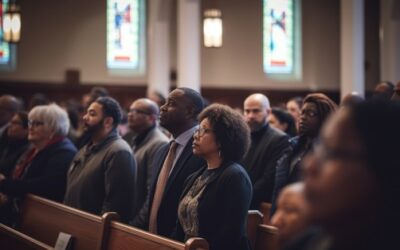What is the role of a pastor in the Adventist Church?
The position itself, at least as far as a local congregation is concerned, is not much different from that of pastors in other protestant denominations.
An Adventist pastor’s role is to nurture the congregation to become more like Jesus Christ. They do this by preaching sermons, encouraging evangelistic efforts, and providing support and guidance for church members.
But how exactly is this role supported by the Bible?
Let’s look more closely at:
- The biblical origins of pastors
- The role and duties of a pastor
- The job qualifications of an Adventist pastor
- Pastoral ordination
- Types of pastors
- How Adventist pastors preach the Bible
- How the pastoral ministry evolved
We’ll start with how the role of an Adventist pastor began.
The biblical origins of pastors
 Individual congregations of the Seventh-day Adventist Church are led by church pastors. This ministerial position is not only essential to the work of the church, it’s also a biblical reflection of leadership:
Individual congregations of the Seventh-day Adventist Church are led by church pastors. This ministerial position is not only essential to the work of the church, it’s also a biblical reflection of leadership:
“And He Himself gave some to be apostles, some prophets, some evangelists, and some pastors and teachers, for the equipping of the saints for the work of ministry, for the edifying of the body of Christ,…” (Ephesians 4:11-12).
The word “pastor” is Latin for shepherd.
And that’s actually quite fitting. There’s an obvious connection between spiritual leaders and shepherds in the Bible.
Take Moses for instance: He worked as a shepherd (Exodus 3:1). And soon enough, his patient work with wandering sheep prepared him to lead the people of Israel back to God.
David also worked as a shepherd in his boyhood, which prepared him to guide the nation of Israel (Ezekiel 34: 23, NKJV).
When you think of shepherds, you usually think of someone humble, right? Shepherds don’t exalt themselves as lords over their sheep. (That’d be a little silly!) They guide them and protect them from harm. They are compassionate and devoted to their flock.
And that’s exactly what Jesus calls His pastors to be like!
The role of the pastor

Photo by LinkedIn Sales Solutions on Unsplash
In short, a pastor’s job is to lead church members to follow in Jesus’ footsteps. They aim to carry this out in many different ways:
- Preach the Bible: They preach sermons discussing the Bible and its principles, with a focus on how we can apply these concepts to our lives today.
- Organize outreach events: Depending on the needs of their community, pastors lead their church in organizing events such as health seminars, family fun events, holiday programs, literature distribution, etc. They also encourage members to collaborate with local community service initiatives, or to organize their own.
- Guide evangelism efforts: Pastors provide ideas and support for their church in planning things like evangelistic events or series, inviting Adventist evangelists to present at their church, or gathering Bible study interests in the area.
- Lead special ceremonies or programs: You’ll often see pastors performing baptisms, marriages, funerals, etc.
- Prepare worship service: They recruit members to perform parts of the weekly Sabbath worship service like special music and prayer. Some pastors will suggest certain hymns, songs, or passages of Scripture for the service that goes along with the topic of that week’s sermon.
- Create a program for visiting those in need: Pastors always keep note of members who are lonely, ill, elderly, or simply unable to leave their homes. Depending on the size of the congregation, the pastor will make the rounds to visit these church members or delegate some elders to help as well.
- Nurture church growth: They encourage members to grow toward baptism and strengthen their relationships with Christ.
That’s a lot of work for one person!
Fortunately, another well-known duty of a pastor is to properly and efficiently delegate appropriate jobs to the established structure of the congregation.
For example, Adventist churches are set up so the pastor gets to work with the local church board. The church board is made up of church-elected members who vote to make church decisions, like registering new members, deciding the best uses for the church budget, or maintaining the church calendar of events and activities.
And even though pastors lead the board as the chairperson, their role is more of an advisor than acting as one who calls all the shots.1 The idea is to help the church work together as a team.
Pastors also delegate tasks to church elders, deacons, and deaconesses who help with various routine functions of a church.
Different types of pastors
The bigger the church, the more pastors are needed to manage church affairs. Here’s a short list of some of the different types of pastors you might encounter:
- Senior pastor: These pastors are the main authority in the church. They handle the bulk of the responsibility.
- Associate pastor: An associate pastor assists the senior pastor in their duties. Their position could be general, or it could take on specific titles, depending on the needs of the congregation. Some examples of these titles could be:
- Young families pastor
- Discipleship pastor
- Children’s pastor
- Executive or administrative pastor
- Young adult pastor
- Outreach pastor
- Youth pastor: A very common type of associate pastor that oversees youth events for the church and community. This includes the youth Sabbath school class(es), availability for counseling and guidance, and leadership or assistance in other groups or programs, such as pathfinders, campus ministries, etc.
Pastors as Bible preachers
Even amid all the various tasks involved in leading and nurturing a congregation, one of the most important duties of a Christian pastor is to preach the Word of God.
Adventist pastors do this by using Scripture to determine how we should strive to live each day.
They also encourage church members to study the Bible for themselves.
“And I will give you shepherds according to My heart, who will feed you with knowledge and understanding” (Jeremiah 3:15).
Members are welcome to approach their pastors about Biblical matters. They may ask questions or address any ideas that confuse them.
After all, it’s one of a pastor’s greatest callings—to explain the Bible for people to understand.
Job qualifications of Adventist pastors
 Pastors must have a bachelor’s degree in theology and a masters in divinity.
Pastors must have a bachelor’s degree in theology and a masters in divinity.
Getting a bachelor’s degree takes about four years, and can be taken at any Adventist school, while a masters in divinity must be obtained through programs like the Theological Seminary at the Adventist University of Africa in Nairobi Kenya.
Getting a master’s typically takes two years, and an additional four years of serving hands-on at local churches before the General Conference decides if the pastor is ready to be ordained.
This level of education helps build Bible knowledge in general, while also teaching methods of conducting Bible studies and the ins and outs of leading local congregations.
Students also study Greek and Hebrew to help them better understand Scripture’s original languages.
But beyond these practical benchmarks, there is one essential condition:
Pastors must be called by the Holy Spirit (Acts 1:8).
Even with all the training in the world, one could not be a pastor in the true sense of the word without the Holy Spirit’s blessing. It’s a difficult job that calls for someone with a special character and extraordinary gifts.
What is ordination?
Not every Adventist pastor is ordained. In fact, many pastors are instead licensed pastors.
But what exactly is the difference between ordained and licensed pastors?
Let’s start with going through the process of ordination.
Ordination is when a pastor asks to have their position recognized by the world church. This recognition comes with several important requirements.
Before being ordained, pastors must have a Master’s in Divinity and have at least four years of experience working with churches. The local conference, the governing body that oversees local churches in the area, will consider the pastor’s performance before putting in an ordination request, which is then submitted to the next level of administration (union office) and put to a vote.
When the request is approved, the pastor’s local church will arrange an ordination ceremony.
Conference officers often attend the ordination ceremonies, while ordained leaders like local elders and other pastors will lay hands on the pastor and pray for God to bless their ministry. 1 Timothy 4:14 and 2 Timothy 1:6 both discuss this practice of “laying on hands” to bless someone.
Ordination allows pastors to work beyond their local church,2 whereas the authority of licensed pastors is contained within their local church. This is part of the reason most pastors must be ordained to officiate wedding ceremonies, especially if they’re visiting another state. Although, some states require pastors to be registered as ordained pastors regardless.3
Licensed pastors are also supervised by an ordained pastor. This can be seen as a training period for licensed pastors, providing valuable on-the-job experience before they seek ordination.4
How the pastoral ministry evolved in the Adventist Church
 When Adventism first began, pastors assumed a more evangelistic role. Church leaders saw the value in having traveling ministers share the gospel.5
When Adventism first began, pastors assumed a more evangelistic role. Church leaders saw the value in having traveling ministers share the gospel.5
But, as the Adventist Church began to grow, there was a greater need for pastors to stay in one spot. They realized that pastors had a duty to lead and care for the Christians already in their care.6 While Adventists still have evangelists who travel to reach people across the globe, they have local pastors to nurture church growth.
Today, the General Conference assigns pastors to a church. And instead of congregations paying their pastors, local conferences are responsible for paying pastors a liveable wage with tithe money. That way, smaller churches and bigger churches alike can be assured pastoral leadership.
The pastoral ministry has indeed changed over the years—but the pastor’s call remains the same. They still occupy a role similar to the example of Jesus: the “good shepherd” (John 10:11).
Jesus was patient, compassionate, balanced, and sought the good of His followers. These are the ideals Adventist pastors strive to follow when providing pastoral care.
God has given pastors the incredible honor and responsibility of guiding His people in a faith community. Ordained or not, it is always a pastor’s job to nurture their “flock” and seek to bring people closer to Jesus.
You can be sure that pastors feel equally blessed to have this role:
“I think pastors have a unique opportunity to present people with hope. You can use your gifts and strengths to let God guide you to reach others.” —Pastor Buz Menhardt of the New Market Seventh-day Adventist Church.
Now that you’re an expert on pastors, learn what an Adventist worship service is like! Check out —
- Hudson, A. Stanley, “Pastoral Roles in Adventism’s First Century,” Ministry Magazine, https://www.ministrymagazine.org/archive/1997/06/pastoral-roles-in-adventisms-first-century. [↵]
- Seventh-day Adventist Church Manual, 19th Edition, pp. 32, 75. [↵]
- “Can I Officiate Weddings in Other States?” theamm.org, https://theamm.org/faq/17-can-i-officiate-weddings-in-other-states. [↵]
- Seventh-day Adventist Church Manual, 19th Edition, p. 33. [↵]
- Hudson, A. Stanley, “Pastoral Roles in Adventism’s First Century,” Ministry Magazine, https://www.ministrymagazine.org/archive/1997/06/pastoral-roles-in-adventisms-first-century. [↵]
- Ibid. [↵]
Related Articles
More Answers
What Does the Bible Say About Modesty
The Bible teaches that modesty, a form of humility and respect, is a valuable quality in everyone—men, women and children. It has to do with how we present ourselves, which should exemplify our inner relationship with God.
13th Sabbath Offering: What It Is and Why It Matters
On the last Sabbath of every quarter, Adventist churches participate in the 13th Sabbath offering—a special offering that goes to mission fields around the world.
Adventist Movies: Where Faith and Film Meet
The Seventh-day Adventist Church’s mission from the beginning has been to share God’s truth in the Bible. And as times have changed, we’ve explored new ways of doing this—one of those being movies.
Everything You Need to Know About an Adventist Church Potluck
Every so often, usually on a schedule ranging from once a week to once a month to once a quarter, an Adventist church will have “fellowship dinners,” often casually referred to as potlucks.
How to Join the Seventh-day Adventist Church
Whether you heard about the Seventh-day Adventist Church through a traveling evangelist, during your online searches, or through a loved one or relative, you might be considering joining yourself.
How Do Adventists Make Movie and Music Choices?
We have entertainment at our fingertips. With just a tap on our smartphones, we can access all the latest movies, music, YouTube videos, and more.
Do Adventists Celebrate Birthdays?
Yes, most Seventh-day Adventists do celebrate birthdays because we see them as excellent reminders of the life God has blessed us with. And we celebrate them the same way everyone else does—with friends, family, presents, and a special meal.
Are Seventh-day Adventists Christians?
Yes, the Seventh-day Adventist Church is a Protestant Christian denomination formed in 1863. Just like other Christians, we believe that Jesus Christ is our Savior and seek to follow the principles of the Word of God.
Do Seventh-day Adventists Believe in the Secret Rapture
The secret rapture belief asserts that the followers of Jesus will be suddenly and stealthily “raptured” from earth and taken to heaven. Then, any people left on earth will face a period of great difficulty—before Christ’s second coming actually happens.
The Seventh-day Adventist Hymnal
The Seventh-day Adventist Hymnal is a songbook used worldwide by many Adventist congregations during their worship services. Since its publication in 1985, it has helped foster praise to God while reminding church members of our mission and drawing them closer to Jesus.
Do Adventists Have Their Own Bible?
Adventists have some unique beliefs—you might be able to name some of them right now. The seventh-day Sabbath. Death as a sleep. Hell as nonexistence.
Do Adventists Celebrate Communion and Foot Washing?
Like many Christian denominations, Adventists regularly participate in communion, also referred to as the “Lord’s Supper” or the “Last Supper.” They also practice foot washing (John 13:1-20), or the “ordinance of humility,” during the service—which isn’t as common.
How do Adventists choose what to eat?
Every day, parents go through the ritual of getting their kids to eat what is healthy and good while trying to steer them away from what can hinder the growth of their developing bodies. Nutritionists work with their clients to make better food choices.
What Are Seventh-Day Adventist Sermons Like?
In nearly every Seventh-day Adventist Church, the sermon is the focal point of the main service—similar to many Protestant Christian denominations. It is a time of biblical instruction by the pastor, who shares what they’ve been studying in the Bible and preparing over the previous week.
Didn’t find your answer? Ask us!
We understand your concern of having questions but not knowing who to ask—we’ve felt it ourselves. When you’re ready to learn more about Adventists, send us a question! We know a thing or two about Adventists.
















